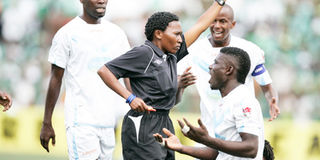Kenya’s women football referees going places

Referee Damaris Kimani in charge during the Gor Mahia Premier League match with Thika at City Stadium on November 10, 2012. PHOTO | FILE |
What you need to know:
- To break it down, the “women in black” are least controversial as they tend to make right decisions even at critical moments.
- They also command more respect from players, coaches, managers and fans.
- This is in stark contrast to the male referees, who perhaps seem all too keen to stamp their authority even when the environment doesn’t necessarily encourage this.
Football has over the years been a male dominated sport both on the pitch and outside it. Focus has been around physicality and masculinity of players.
Men currently dominate most of the decision making posts in the sport.
Thankfully, this scenario is gradually changing, as focus shifts towards contribution of women to the growth of the game.
Women in Kenya have courageously embraced opportunities normally reserved for men with Maculate Akorot, Margaret Omondi, Cecilia Gitau, Tabitha Njoroge and Damaris Kimani among others for instance, contributing to the game by getting involved in refereeing at the highest level.
I recently attended the second quarter of the 2018 Football Kenya Federation Referees Physical Endurance Test (PET) in Nairobi and got to witness first-hand the gradual transformation and influence of women referees in the Kenyan game.
In fact, statistics gathered by the federation over the last two years suggest women are the most reliable referees.
To break it down, the “women in black” are least controversial as they tend to make right decisions even at critical moments.
They also command more respect from players, coaches, managers and fans.
This is in stark contrast to the male referees, who perhaps seem all too keen to stamp their authority even when the environment doesn’t necessarily encourage this.
This background is important in justifying the need for women referees to be judged by their abilities on the pitch other than just their gender.
A common modern adage goes, whatever a man can do, a woman can do better.
This could be why our own Mary Njoroge was selected to officiate at the 2018 Under-20 Women’s World Cup set for France in August.
Caroline Wanja too is among those appointed to officiate at the Women’s Africa Cup of Nations in Ghana in November.
It may not happen overnight, but our hope is that Kenyan women referees will be appointed to handle matches in top competitions. Why? Because they deserve to.
And while at it, women with a passion and vision are encouraged to offer themselves to serving in football in various positions.
They need to look at participating in football as a job opportunity and a platform to make a difference to the game and the society.
Fifa Secretary General Fatma Samoura, the first women to serve in such a senior position at the world’s football governing body, should act as the perfect role model.




